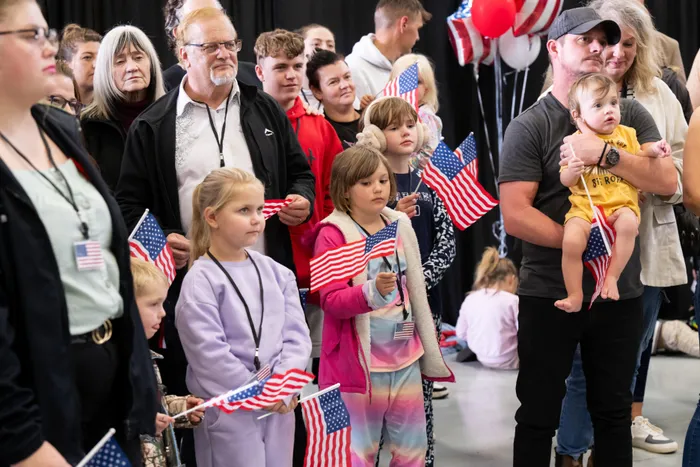
The first group of Afrikaners from South Africa to arrive for resettlement listen to remarks from US Deputy Secretary of State Christopher Landau and US Deputy Secretary of Homeland Security Troy Edgar after they arrived at Washington Dulles International Airport in Dulles, Virginia
Image: SAUL LOEB/AFP
The first group of Afrikaners who left for the United States will be housed in areas across the country.
The group of more than 40 Afrikaners boarded a flight from the OR Tambo International Airport to the US, as part of President Donald Trump's refugee policy. The flight was paid for by the US government.
IOL previously reported how Trump summarily pulled the plug on South Africa’s over $400 million funding from the United States Agency for International Development (USAID) and also offered white Afrikaner South Africans refugee status in the US after President Cyril Ramaphosa signed the Expropriation Act into law in January.
According to reports, they will be sent to areas including Minnesota, Nevada and Idaho.
Washington-based news site, National Public Radio or NPC reported that the group will be able to apply for US citizenship, and eligible to receive government benefits.
The site further stated that those Afrikaners with family in the US will be assisted, while those without family in the US will be provided support from local organisations.
The group is further advised to "quickly find work" with adults expected to take up jobs in manufacturing, customer service, and warehousing. It is unclear if they will be able to continue farming in the US.
Spokesperson at the Department of International Relations and Cooperation (Dirco), Chrispin Phiri, said those who left for the US under the refugee program would have to revoke their refugee status if they wanted to come back to SA.
"Once you say you flee a country because you are being persecuted in the country, once you are in the host country, it would be difficult to engage with the diplomatic services of that country [you fled from] because that's the country that is persecuting you.
"If they choose to do so, they would revoke their refugee status in the host country. They are welcome to come back, but the implications for them, in terms of international and refugee law, you then revoke refugee status in the host country.
"You can't be seeking refuge and then decide to go back home, have a braai, then go back to the host country where I am safer," he told eNCA.
Meanwhile, the Episcopal Church, which helps refugees forced to seek refuge in the US, has refused to help with the resettlement of the group.
In a letter, Most Rev. Sean W. Rowe terminated the church's partnership with the US government.
"Just over two weeks ago, the federal government informed Episcopal Migration Ministries that under the terms of our federal grant, we are expected to resettle white Afrikaners from South Africa, whom the US government has classified as refugees.
"In light of our church’s steadfast commitment to racial justice and reconciliation and our historic ties with the Anglican Church of Southern Africa, we are not able to take this step. Accordingly, we have determined that, by the end of the federal fiscal year, we will conclude our refugee resettlement grant agreements with the US federal government," Rowe said.
Rowe said, "it has been painful to watch" how the government has selected one group to receive preferential treatment over others who have been waiting years in refugee camps or dangerous conditions for years.
Dirco Minister, Ronald Lamola, rubbished the group's claims of persecution.
"We reiterate that allegations of discrimination are unfounded. The South African Police Service (SAPS) statistics on farm-related crimes do not support allegations of violent crime targeted at farmers generally or any particular race.
"There are sufficient structures available within South Africa to address concerns of discrimination. Moreover, even if there are allegations of discrimination, it is our view that these do not meet the threshold of persecution required under domestic and international refugee law," he said.
“Those people who have fled are not being persecuted. They are not being hounded. They are not being treated badly. They are leaving ostensibly because they don't want to embrace the changes that are taking place in our country, by our Constitution," he said on the sidelines of the Presidential panel at the African CEO Forum 2025 in Abidjan, Cote d’Ivoire.
Ramaphosa is planning to meet with Trump to further discuss the matter.
In a media briefing, Trump confirmed the meeting with the SA government.
seanne.rall@iol.co.za
IOL
Related Topics: